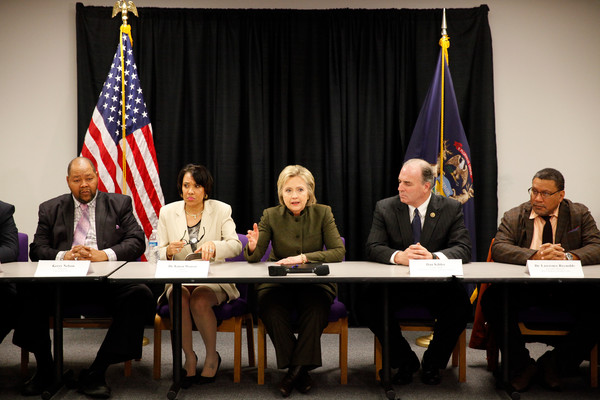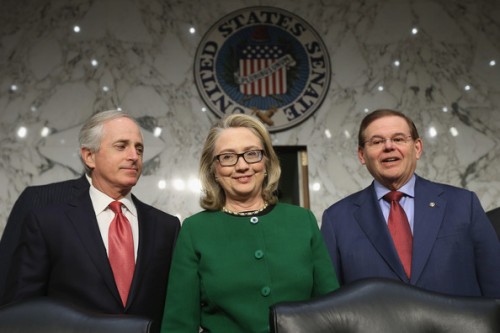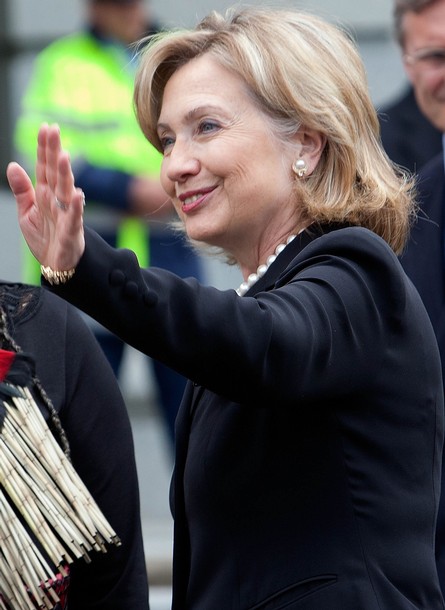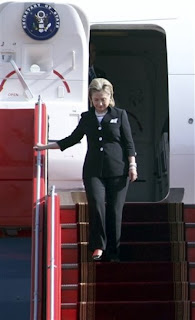2+2 Meeting between the U.S. and the Philippines, posted with vodpod
Remarks With Secretary of Defense Leon Panetta, Philippines Foreign Secretary Albert del Rosario, and Philippines Defense Secretary Voltaire Gazmin After Their Meeting
Remarks
Hillary Rodham Clinton
Secretary of StateTreaty RoomWashington, DCApril 30, 2012
SECRETARY CLINTON:Good afternoon. It is such a pleasure for me to welcome our colleagues from the Philippines, Secretary del Rosario and Secretary Gazmin. And I am always happy to welcome my longtime friend and colleague, Secretary Panetta.Today we held the first ever 2+2 meeting between the United States and the Philippines, a testament to our shared commitment to write a new chapter in the partnership between our two countries. With the growing security and economic importance of the Asia Pacific, the United States is actively working to strengthen our alliances, build new partnerships, and engage more systematically in the region’s multilateral institutions.
At the heart of this strategy is our effort to deepen and broaden our alliance with our friend and treaty ally, the Philippines. This alliance is rooted not just in a deep history of shared democratic values but in a wide range of mutual concerns. And today we had a chance to cover a number of them.
First we discussed our bilateral military cooperation. Our alliance has helped keep both of our countries secure for more than 60 years, and it has been a bulwark of peace and stability in Asia. Today the United States reaffirms our commitment and obligations under the mutual defense treaty.
We also discussed steps we are taking to ensure that our countries are fully capable of addressing both the challenges and the opportunities posed in the region in the 21st century. We need to continue working together to counter violent extremism, to work on addressing natural disasters, maritime security, and transnational crime.
We also discussed the evolving regional security situation. We both share deep concerns about the developments on the Korean Peninsula and events in the South China Sea, including recent tensions surrounding the Scarborough Shoal. In this context, the United States has been clear and consistent. While we do not take sides on the competing sovereignty claims to land features in the South China Sea, as a Pacific power we have a national interest in freedom of navigation, the maintenance of peace and stability, respect for international law, and the unimpeded, lawful commerce across our sea lanes. The United States supports a collaborative diplomatic process by all those involved for resolving the various disputes that they encounter. We oppose the threat or use of force by any party to advance its claims. And we will remain in close contact with our ally, the Philippines. I look forward to continuing to work closely with the foreign secretary as we approach the ASEAN Regional Forum in July.
Finally, we discussed the maturing economic relationship between our countries as well as our shared commitment to enhanced development, trade, and investment. We would like to see the Philippines join the Trans Pacific Partnership trade community. The foreign secretary raised the Philippines’ interest in seeking passage of the Save our Industries Act, and we have conveyed that message to the United States Congress. And of course, I complimented the Philippines and the Aquino government on the progress with our Partnership for Growth and the Millennium Challenge Corporation Compact.
So once again, colleagues and friends, we appreciate your participating in this first ever 2+2, and we look forward to our future cooperation.
Secretary del Rosario.
SECRETARY DEL ROSARIO: Thank you very much, Madam Secretary. I am honored to be here. Today marks a milestone in the alliance and strategic partnership of the Philippines and the United States. For the first time, we held our 2+2 consultations at the ministerial level. Our consultations were timely. Discussions on key issues of common interest to us were conducted within the context of our respective domestic concerns as well as the challenges and opportunities which coexist in the Asia Pacific region. The 2+2 consultations paved the way for us to revisit the bilateral engagement between the Philippines and the United States. It opened an avenue for us to consider ways of fine-tuning our relations as we adapt to changing circumstances both in our region and the world at large. Thus, the focal points of our consultations were how best to keep our alliance relevant and responsive to each other’s needs.
We reaffirmed our shared obligations under our mutual defense treaty and underscored the necessity of ensuring that our alliance remains robust, agile, and responsive. We committed to jointly explore modalities by which the President could build a minimum credible defense posture and agreed to prioritize high-value and high-impact joint military exercises and training to meet our common objectives, including maritime security.
Moreover, we reaffirmed our common interest in maintaining freedom of navigation, unimpeded lawful commerce and transit of peoples, as well as a rules-based multilateral, peaceful approach in resolving competing claims in maritime areas within the framework of international law, including UNCLOS.
In the field of economic and development cooperation, we agreed to accelerate the implementation of the Partnership for Growth, which aims to establish an inclusive growth path for the Philippines as well as the Millennium Challenge Compact to reduce poverty in our country.
The Philippines and the United States shall endeavor to increase bilateral trade and investment as well as tourism exchanges. We agreed to continue discussions on Philippine interest to eventually join the Trans Pacific Partnership Agreement. In the area of good governance, we shall promote the establishment of a national justice information system for the Philippines. We will also work to sustain our partnership in combating human trafficking.
In the multilateral arena, we both expressed support for efforts to increase cooperation in the ASEAN, in APEC, and in the East Asia Summit. Beyond doubt, the combined action of the Philippines and the U.S. in promoting converting interests and shared objectives would propel our alliance and strategic partnership towards a higher trajectory at a faster velocity.
Our just-concluded 2+2 consultations is the latest impetus in sustaining this positive momentum. Thank you very much.
SECRETARY CLINTON: Thank you. Secretary Panetta.
SECRETARY PANETTA: Good afternoon. I’d like to join Secretary Clinton in saying what a great pleasure it was to host Secretary del Rosario and Secretary Gazmin for one of the first 2 by 2 meetings here in Washington with the Philippines. I look forward to hosting Secretary Gazmin for dinner at the Pentagon this evening.
We had a very successful meeting today with our Filipino counterparts, and we discussed a number of ways our governments can work more closely together to strengthen the importance alliance that we have to deepen our engagements and to find shared solutions to the joint security goals that we share.
Our two nations have forged deep and abiding ties through shared sacrifice and common purpose. Seventy years ago this month, American and Filipino soldiers fought and bled together shoulder to shoulder during the opening battles of World War II at Corregidor and Bataan. Through dark days, and many of those dark days fought together, our forces joined again in 1944 to begin the hard-fought battle to liberate the Philippines. We honor that legacy with our renewed commitment to this U.S.-Philippine alliance.Ours is an alliance and a friendship built on historic ties, common democratic values, and a shared desire to provide our two peoples a prosperous and more secure future. I want to emphasize how deeply the U.S. values this great partnership and the importance of the Mutual Defense Treaty that remains the cornerstone of our security relationship. Working together, our forces successfully are countering terrorist groups in the southern Philippines. We are improving the Philippines maritime presence and capabilities with the transfer of a second high-endurance cutter this year. We are working to expand and improve joint ISR programs and our ability to counter cyber attacks. And I’m pleased to see the close cooperation being built between our forces through training and exercises such as the recently completed exercise Balikatan in 2012.
The new U.S. defense strategy that we rolled out earlier this year recognized that one of the important regions of the world that we must focus on and that America’s future security depends on is the Asia Pacific region. As a resident Pacific power, the United States is committed to a rule-based regional order that promotes viable and vibrant trade and the freedom of navigation. We are enhancing our defense cooperation and expanding security partnerships throughout the region in order to sustain peace and stability, and we are committed to continuing our robust, stabilizing presence in that region.
I look forward to sitting down later today with Secretary Gazmin to discuss, among other things, how we can deepen our engagement in ways that enhance this very important alliance and that promote our common vision of regional security in a very important Asia Pacific region. Thank you.
SECRETARY CLINTON: Secretary Gazmin.
SECRETARY GAZMIN: Good afternoon. Today’s meeting was a manifestation of the mutual desire of the Philippines and the U.S. to further deepen our strategic partnership. After watching our alliance endure through the years, we deem it crucial to prepare for the security challenges of today and tomorrow.
This is why we decided to hold the first 2+2 meeting, to be able to exchange views on how to formulate adoptive and responsive strategic policies. We have reached a critical juncture in our alliance, where our concerns in both traditional and nontraditional aspects of our security have become much more intertwined. While we are sustaining the gains for successful efforts in various areas of cooperation, we need to intensify our mutual trust to uphold maritime security and the freedom of navigation and thereby contribute to the peace and stability of the region.
Meanwhile, the effects of natural disasters have become too disastrous and thus necessitate greater cooperation for expedient and effective response. We look forward to working together and consult one another on how to improve the capability to uphold maritime security and institutionalize efficient humanitarian assistance and disaster response.Keeping these two objectives in mind, we look forward in working as reliable allies that contribute to the peace and stability in the region. We are also mindful that our efforts to further our alliance need to be in full consideration of our respective national laws and political context.
Thank you and good afternoon.
SECRETARY CLINTON: Thank you.
MS. NULAND: We’ll take two from each side today. We’ll start with NBC, Andrea Mitchell.
QUESTION: Thank you very much. Madam Secretary, thank you. I know you can’t get into the specifics of the Chen Guangcheng case, but the whole world is watching. And already Mitt Romney has said that any serious U.S. policy towards China has to confront the facts of the lack of political freedoms and other human rights abuses. So can we be sure that your interests, America’s interests in these talks in strategic issues such as Iran and Syria and North Korea and trade will not take precedence over human rights? And what are your concerns about all the activists who have now gone missing and the fate of Mr. Chen’s family?
SECRETARY CLINTON: Well, Andrea, I look forward to traveling to China this evening. We will be going to Beijing for the Strategic and Economic Dialogue. We have a full range of issues that covers all of the political and economic matters that are of concern to our nations and our people. I’m not going to address the specific case at this time, but I just want to put it in a broader context.
The U.S.-China relationship is important. It’s important not only to President Obama and me, but it’s important to the people of the United States and the world, and we’ve worked hard to build an effective, constructive, comprehensive relationship that allows us to find ways to work together. Now a constructive relationship includes talking very frankly about those areas where we do not agree, including human rights. That is the spirit that is guiding me as I take off for Beijing tonight, and I can certainly guarantee that we will be discussing every matter, including human rights, that is pending between us.
QUESTION: And those people who have gone missing?
SECRETARY CLINTON: I have nothing to add to what I’ve said at this time. I have a full agenda of many issues of great concern to us, including human rights and the freedom and free movement of people inside China who have a right to exercise those freedoms under the Universal Declaration of Human Rights.
MS. NULAND: Next question, Jose (inaudible).
QUESTION: Mr. del Rosario, the standoff at the Scarborough Shoal is into its fourth week now. Did you get an unequivocal assurance from the U.S. it will come to the aid of the Philippines if shots are fired? And what was the type or form?
Also, short of shots being fired, how do you see the endgame of Scarborough being played out if China cannot be persuaded diplomatically to withdraw its vessels from the area?
SECRETARY DEL ROSARIO: Those are several questions rolled into one, my friend, but let me begin from your last question. We do have a three-track approach to endeavoring to solve the problem that we currently have with China in the Scarborough Shoal. It encompasses three tracks.
The first track is the political track. We are pursuing the ASEAN as a framework for a solution to this problem through a code of conduct that we are trying to put together and ultimately approve. Hopefully that will quiet the situation.
Secondly, we are pursuing a legal track, and the legal track involves our pursuing a dispute settlement mechanism under UNCLOS. There are five of them. We think that we can avail of one or two of those mechanisms, even without the presence of China.
Thirdly, we are pursuing a diplomatic approach, such as the one that we are undertaking, which is to have consultations with China in an attempt to defuse the situation.
In terms of U.S. commitment, I think the U.S. has been very clear that they do not get involved in territorial disputes, but that they are firm in terms of taking a position for a – towards a peaceful settlement of the disputes in the South China Sea towards a multilateral approach and towards the use of a rules-based regime in accordance with international law, specifically UNCLOS. They have expressed that they will honor their obligations under the Mutual Defense Treaty.
MS. NULAND: Next, Cami McCormick from CBS News.
QUESTION: Secretary Panetta, this is for you. White House Counterterrorism official John Brennan today spoke openly for the first time about drones. He said the – President Obama wanted more transparency on this issue and more openness. As former CIA director and now Defense Secretary, I’m wondering, is there some national security benefit to talking about this now? Why was the decision made? And what are your thoughts on it?
SECRETARY PANETTA: I’m going to let the speech speak for itself. All I’ll say is that this country has engaged in a number of operations, both covert and overt, to go after al-Qaida and our terrorist allies – or their terrorist allies. And we have been very successful at weakening al-Qaida as a result of that. This is a group that attacked this country on 9/11, and we have made clear that we are going to do everything we can to defend this country, using every means possible. And the means we use are those that we feel are most effective to go after al-Qaida.
MS. NULAND: The last question today, (inaudible) Times.
QUESTION: My question is for Secretary Gazmin. Secretary, in light of the current Chinese-Philippines standoff in Scarborough Shoal, what kind of assistance have you asked to bolster Manila’s ability to patrol its waters and to deter what you call intrusions?
SECRETARY GAZMIN: Thank you for the question. The assistance we have sought is to help us bring the case to international legal bodies, so that the approach is the legal rules-based approach in resolving the issue in the South China Sea or the West Philippine Sea.
MS. NULAND: Thank you very much.
SECRETARY CLINTON: Thank you all very much.

































